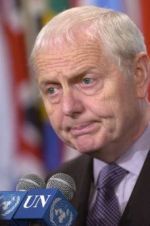UN Security Council faces chilly welcome in Sudan
June 4, 2006 (KHARTOUM) — The U.N. Security Council faces a chilly welcome as it starts a high-level mission to Sudan late Monday aimed at pressuring all key players to end the three-year conflict in Darfur and promote the fragile peace in the south.
 Sudan’s government and the African Union, meanwhile, are trying to persuade two rebel groups from Darfur to sign a peace agreement. Ten days ago, the government dropped its opposition to allowing a U.N. team to visit Darfur to plan for a possible U.N. takeover of peacekeeping in the vast western region from the African force.
Sudan’s government and the African Union, meanwhile, are trying to persuade two rebel groups from Darfur to sign a peace agreement. Ten days ago, the government dropped its opposition to allowing a U.N. team to visit Darfur to plan for a possible U.N. takeover of peacekeeping in the vast western region from the African force.
The government, however, has not yet approved a U.N. force actually replacing the 7,000-strong AU force. The council said in its mission statement that one aim of the trip would be to “make clear to the government of Sudan the benefits of a U.N. mission in Darfur.”
Mustafa Osman Ismail, the ruling National Congress Party’s political relations chief and a presidential adviser on foreign affairs, was quoted in the Sudanese press as saying that the party would welcome the council, but that the country would make its views heard.
“We will not be sitting and listening only, but will present our view on so many of the conducts of the Security Council,” he was quoted as telling journalists after a party meeting Saturday night. “On the issues where the Security Council and the U.N. have had a positive role, we will express our appreciation therein. And in situations and issues where the U.N. and the Security Council have negative roles, we will also explain our position clearly.”
Ismail did not elaborate, but the government’s relations with the council have been tense, especially over the violence in Darfur which has been going on since 2003 when ethnic African rebel groups rose up against the Arab-led Khartoum government.
The government is accused of responding by unleashing Arab militias known as the Janjaweed, who have been accused of some of the worst atrocities in a conflict that has killed 300,000 and displaced more than 2 million. The government denies backing the Janjaweed.
The Security Council has repeatedly called on the government to rein in and disarm the Janjaweed. It also has criticized the government and rebels for cease-fire violations and human rights abuses, and repeatedly called for a political settlement.
After months of negotiation, the government signed a peace deal with the larger faction of the Sudan Liberation Movement. But the Khartoum Monitor and other local newspapers reported Sunday that the latest effort to get the smaller faction to sign on had failed. So have efforts to persuade the rebel Justice and Equality Movement.
Despite the peace deal, the security situation in Darfur has worsened. The African Union force, with few helicopters, has been overstretched, but the government lobbied strongly for it to remain.
With last month’s partial peace deal, the Security Council — under pressure from the United States, Britain and France — passed a resolution setting a one-week deadline for Khartoum to agree to allow a joint U.N.-AU assessment team into Darfur to plan for a U.N. takeover.
U.N. Secretary-General Kofi Annan sent a special envoy, Lakhdar Brahimi, and Assistant Secretary-General for Peacekeeping Hedi Annabi to Khartoum to try to persuade the government to give visas to the U.N.-AU team. Brahimi said Sudan had expected the Security Council to congratulate the government for the May 25 peace deal, but instead the council had approved a resolution making clear that it planned a major operation in Darfur.
“They were very, very upset by this resolution, which they did not expect,” he said. “What we have come here for is to reassure the government of Sudan that we are not going to invade Sudan.”
He said “the Sudan government has the right, at any time, to accept or reject a future United Nations role in Darfur.”
The Security Council also said in a statement that it wanted to demonstrate during this week’s mission its “determination” to work with the government, the AU and other parties “to assist in tackling the various problems confronting Sudan.”
Political observers here said some Sudanese were concerned that several council members had a hidden agenda in coming to Sudan, and would be watching its actions closely. The observers spoke on condition of anonymity because there were not authorized to speak publicly.
The 15 council members will hold a round of meetings Tuesday with government officials, fly to Addis Ababa on Wednesday to hold talks with the African Union, visit Juba in southern Sudan on Thursday, Darfur on Friday and neighboring Chad on Saturday before heading to Congo.
Ismail, the National Congress Party official, expressed hope that the council would get to see “what is going on in Darfur” — not from reports.
The Security Council has traveled to Africa regularly. Its highest profile trip was to Kenya in November 2004 to pressure the Sudanese government and southern rebels to conclude a peace agreement ending their 21-year civil war — which they did weeks later on Jan. 9, 2005.
In Juba, the southern capital, the council will assess progress in implementing the peace deal, which is being monitored by a 10,000-strong U.N. force. Britain’s U.N.
Ambassador Emyr Jones Parry, who is leading the mission, said it also would press the southern Sudanese to arrest leaders of Uganda’s Lord’s Resistance Army, blamed for kidnapping thousands of children.
(ST/AP)
